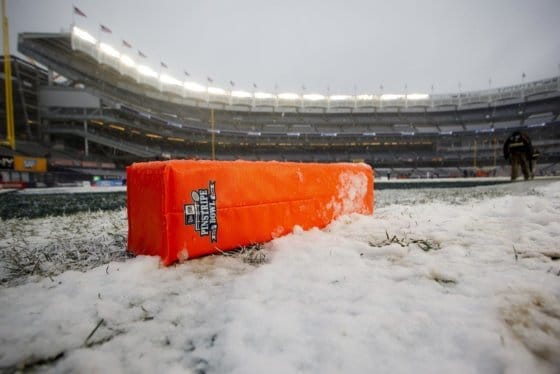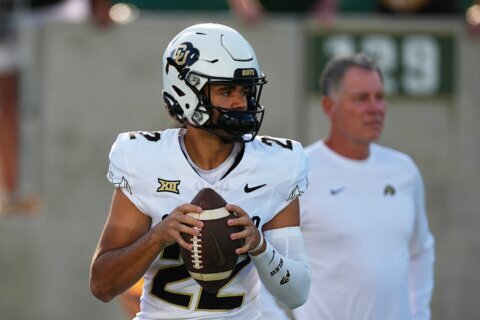WASHINGTON — Four weeks ago, on an unseasonably cold Friday night in Blacksburg, Virginia football seemed on the verge of a breakthrough moment for the program, while Virginia Tech stood at the precipice of the wrong kind of history. A Virginia win would be the first in the rivalry since 2003. But it would cost the Hokies their bowl eligibility, and would also cost the Military Bowl its prime target for this year’s game, setting off a chain reaction around the bowl landscape.
The Military Bowl Presented by Northrop Grumman, kicking off at noon on Dec. 31 at Navy-Marine Corps Memorial Stadium in Annapolis, is one of 40 bowl games this year, including the College Football Playoff National Championship Game. With conference tie-ins to the ACC and American Athletic Conference (AAC), they’ve usually got a number of teams from either side that fit the criteria they most desire in a matchup.
“Everybody has different reasoning for the teams they want,” Steve Beck, Military Bowl Foundation President & Executive Director, explained to WTOP. “Ticket sales and (ease of) travel are really important for us.”
That might sound obvious, but TV revenue can play a larger factor for some games than actual butts in seats. For instance, a school with a long, national history like Miami might be better for TV, but not for travel to the D.C. area. But a school like Virginia Tech — just a few hours to the south and with 55,000 alumni in the Washington region — is a great fit for the Military Bowl.
Teams need at least six wins to be bowl eligible, and Tech entered that rivalry game in in Blacksburg on Nov. 23 with a 4-6 record. Only a win would trigger an additional game, the following week, to try to get to 6-6.
With less than four minutes left, up four points on the road, Virginia linebacker Charles Snowden picked off Tech quarterback Ryan Willis inside the Hokies 15 yard line. If the Hoos could punch it into the end zone, the game would be over, as would two streaks — 14 straight Virginia Tech wins in the series, and a 25-year bowl streak, the longest in the nation.
After a three-and-out, Virginia settled for a field goal to go up seven with 2:41 to play. Virginia Tech drove the length of the field, but after breaking through on his way to the possible game-tying score, running back James Peoples was hit just outside the five yard line. The ball sprung loose, momentum carrying it into the end zone, right in front of Cavaliers safety Brenton Nelson. If Virginia recovered, with no Hokie timeouts remaining, the game would end.
Instead, Virginia Tech landed on the ball for a game-tying touchdown. The Hokies won in overtime, forcing the make-up game against Marshall the following Saturday to become a reality, and prompting a pre-dawn wake-up call that day for Beck and Retired Rear Admiral Chris Cole, the Chairman of the Board of the Military Bowl Foundation.
Beck left his house around 6:30 that morning, picking up Cole in Vienna, Virginia at about 7:00. The duo made the 240-mile trek to Blacksburg together for the noon kick, knowing the game was far from a coronation. Marshall was 8-3, winners of three straight and five of six coming in. A Hokies loss would make for a scramble of a week, and a long car trip home.
“I love the Marshall fan base — they’ve got really great, passionate fans,” said Beck, the praise serving as a caveat for his feelings on the game. “But I was definitely pulling for Virginia Tech that day.”
Sure enough, Va. Tech pulled through, riding a hot start to a 41-20 victory. With the Hokies bowl eligible, Beck turned his attention to the American Athletic Conference Championship Game on his iPhone, while Cole drove back to Virginia. If Memphis upset UCF, the Knights might have made for a great option from the AAC — they’d been a great national story, and would still be a ranked team even after the loss. But they prevailed in a comeback win behind backup quarterback Darriel Mack Jr., denting Beck’s Verizon bill, but seemingly cementing a 10-2 Cincinnati squad as the likely AAC representative.
But there were still more twists in the road, the last of which came down on Selection Sunday, Dec. 2.
Bowls make a conscious effort to avoid regular season rematches. So when a potential arrangement in another game including an ACC team would have pitted two teams that had played earlier this season against one another, there was a possibility that the order Beck was counting on could be thrown into chaos. When he called into the customary 3:15 p.m. conference call on Sunday to sort through the details, the games ahead of the Military Bowl in the pecking order had yet to be decided. A moment of panic set in, as the bowl staff began writing up different press releases for different schools, not knowing how everything would shake out.
There were some other potentially good matches — a reunion of Paul Johnson, playing at Navy Memorial Stadium in his send-off game, would make for a good story, though Georgia Tech is hardly close geographically. There had been a rumor floating around that perhaps Army would be playing in the game this year, taking the spot of one of the tied-in conferences. But that would have been out of Beck’s hands, and may not have come down to the wire.
“If it wasn’t going to be a team from one of those conferences, it would be the conference who would have to agree to do something different,” he said.
Army ended up in the Armed Forces Bowl (not to be confused with the Military Bowl), usually a Big 12 vs. AAC game. But such a switch wouldn’t have been unprecedented, nor would it necessarily mean a lower quality or less exciting matchup.
That’s happened before, like when the Sugar Bowl unexpectedly pulled an 8-4 Virginia Tech for the Jan. 3, 2012 game against Michigan. The Military Bowl ended up filling the void with Toledo facing Air Force, a matchup that yielded a wildly entertaining, 42-41 Rockets win when the Falcons chose to go for a 2-point conversion and the win in the closing seconds, but could not convert.
Pittsburgh had drawn a sellout crowd in 2015 when the Panthers squared off against hometown Navy, thanks in part to a fortuitous scheduling quirk — the Steelers had played in Baltimore against the Ravens the day before, bringing lots of extra fans in for the weekend.
Still, with the way the year had shaken out, looking at the available teams, Beck knew which team he wanted.
“We had some other choices, but once we knew Virginia Tech was eligible, we were honed in on them,” said Beck.
After an agonizing 15 minutes, the normal press release deadline of 3:30 p.m. come and gone, the Military Bowl finally got word — Virginia Tech was, indeed, available. After sweating out all the ways things could have gone awry for 10 days, it didn’t take long for Beck to say yes.







